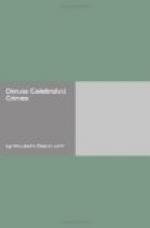Twenty years had gone by since this horrible and mysterious event, which no one sought to unravel at the time it occurred. One June evening, 1771, four persons were sitting in one of the rooms of a modestly furnished, dwelling on the third floor of a house in the rue Saint-Victor. The party consisted of three women and an ecclesiastic, who boarded, for meals only, with the woman who tenanted the dwelling; the other two were near neighbours. They were all friends, and often met thus in the evening to play cards. They were sitting round the card-table, but although it was nearly ten o’clock the cards had not yet been touched. They spoke in low tones, and a half-interrupted confidence had, this evening, put a check on the usual gaiety.
Someone knocked gently at the door, although no sound of steps on the creaking wooden staircase had been heard, and a wheedling voice asked for admittance. The occupier of the room, Madame Legrand, rose, and admitted a man of about six-and-twenty, at whose appearance the four friends exchanged glances, at once observed by the new-comer, who affected, however, not to see them. He bowed successively to the three women, and several times with the utmost respect to the abbe, making signs of apology for the interruption caused by his appearance; then, coughing several times, he turned to Madame Legrand, and said in a feeble voice, which seemed to betoken much suffering—
“My kind mistress, will you and these other ladies excuse my presenting myself at such an hour and in such a costume? I am ill, and I was obliged to get up.”
His costume was certainly singular enough: he was wrapped in a large dressing-gown of flowered chintz; his head was adorned by a nightcap drawn up at the top and surmounted by a muslin frill. His appearance did not contradict his complaint of illness; he was barely four feet six in height, his limbs were bony, his face sharp, thin, and pale. Thus attired, coughing incessantly, dragging his feet as if he had no strength to lift them, holding a lighted candle in one hand and an egg in the other, he suggested a caricature-some imaginary invalid just escaped from M. Purgon. Nevertheless, no one ventured to smile, notwithstanding his valetudinarian appearance and his air of affected humility. The perpetual blinking of the yellow eyelids which fell over the round and hollow eyes, shining with a sombre fire which he could never entirely suppress, reminded one of a bird of prey unable to face the light, and the lines of his face, the hooked nose, and the thin, constantly quivering, drawn-in lips suggested a mixture of boldness and baseness, of cunning and sincerity. But there is no book which can instruct one to read the human countenance correctly; and some special circumstance must have roused the suspicions of these four persons so much as to cause them to make these observations, and they were not as usual deceived by the humbug of this skilled actor, a past master in the art of deception.




